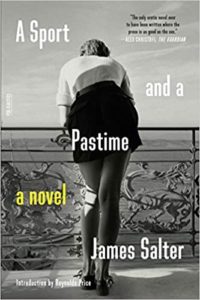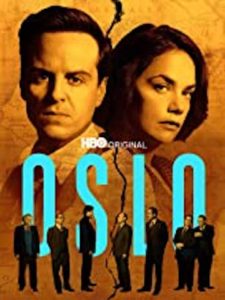
A Sport and a Pastime
by James Salter
204 pages
Originally published in 1967
Paperback published in 2006 by Farrar, Straus and Giroux
A Sport and a Pastime – another Mules Book Club selection – is a short novel. Just 200-something pages. I bought an old paperback copy that I read in bed, and an audio version that I listened to while driving.
I enjoy consuming a book this way. It’s efficient, and it’s multidimensional. Sometimes, when the reader is especially good, I prefer the audiobook. Other times, when I like the voice in my head better than the reader’s, I favor the print. In this case, although the reader did a good job with the dialog, I was less than happy with his reading of the many poetic passages. I wanted him to savor them. He chewed them up.
A Sport and a Pastime is considered by most critics to be a modern classic. And its author, James Salter, has been canonized among America’s great late-20th century novelists, along with Philip Roth, John Updike, and Norman Mailer. When the book was recommended, I thought, “Well, another book I’ve read before.” With the opening paragraph, I realized I hadn’t. And that I was in for a treat:
September. It seems these luminous days will never end. The city, which was almost empty during August, now is filling up again. It is being replenished. The restaurants are all reopening, the shops. People are coming back from the country, the sea, from trips on roads all jammed with cars. The station is very crowded. There are children, dogs, families with old pieces of luggage bound by straps. I make my way among them. It’s like being in a tunnel. Finally I emerge onto the brilliance of the quai, beneath a roof of glass panels which seems to magnify the light.
The Story
A Sport and a Pastime is the story of a summer romance between Philip Dean, an American middle-class college dropout, and Anne-Marie, a French girl. It is told by a highly intelligent, highly self-conscious, and ultimately unreliable narrator (who is unnamed).
The plot – well, it doesn’t have a plot. Unless you think this is a plot… Chapter One: Wake, walk, talk, eat, drink, fuck. Chapter Two: Wake, fuck, eat, walk, go to the movies, drink, fuck. Other chapters: The same, but in a slightly different order.
If that sounds like a condemnation, it’s not. Not entirely. For many good reasons, A Sport and a Pastime deserves its literary status. Salter’s prose is engaging and seductive. The dialog is natural and efficient. The sex scenes are not (as many critics have said) pornographic, but erotic. Erotic in a sparse and almost clinical way. And that renders them believable – which, one realizes in reading them, is a significant literary accomplishment.
Lacking the typical arc of a conventional plot, the narrative gets its forward motion by the elegance of the prose and the mystery of the narrator. He presents himself as a friend of Dean, the protagonist. But he admits to his unreliability from the very first chapter and continues to remind the reader that the narration, though it flows like a memoir, is entirely a product of fiction. In fact, I had the notion that Dean and the narrator were one. Dean being the imagined Alpha of the narrator, or – perhaps more interestingly – the narrator being the imagined Nick Carraway to the author’s actual self.
Critical Reception
A Sport and a Pastime is, as I said, considered a modern classic. But only I and one other Mule felt it deserved that reputation. The rest panned it severely. Most didn’t even finish it. “It’s like Dick and Jane Have Sex,” one said. “Sixteen times in sixteen chapters.”
I was shocked. Most of the time, there is general agreement about the books we read. But A Sport and a Pastime may be the least-liked book we’ve read since we began meeting 10 years ago. Hell, sophomoric, pseudo-literary novels like The Kite Runner, The Underground Railroad, and Where the Crawdads Sing got better reviews.
Reynolds Price, in The New York Times Book Review, wrote: “Of living novelists, none has produced a novel I admire more than A Sport and a Pastime… it’s as nearly perfect as any American fiction I know.”
And as recently as 2017, Sarah Hall, writing for The Guardian, had this to say: “Since its publication in 1967, during the decade of sexual revolution, A Sport and a Pastime has set the standard not only for eroticism in fiction, but for the principal organ of literature – the imagination. What appears at first to be a short, tragic novel about a love affair in France is in fact an ambitious, refractive inquiry into the nature and meaning of storytelling, and the reasons we are compelled to invent, in particular, romances. That such a feat occurs across a mere 200 pages is breathtaking, and though its narrative choreography seems simple, the novel is anything but minor.”
Note: If, after reading A Sport and a Pastime, you want to know more about James Salter, there’s a 54-minute documentary (available on Amazon Prime) that explains his “love affair” with France and his place in modern American fiction. It includes plenty of snippets of his writing, which will give you a feel for the terse beauty of his prose style.
You can watch the trailer here.




